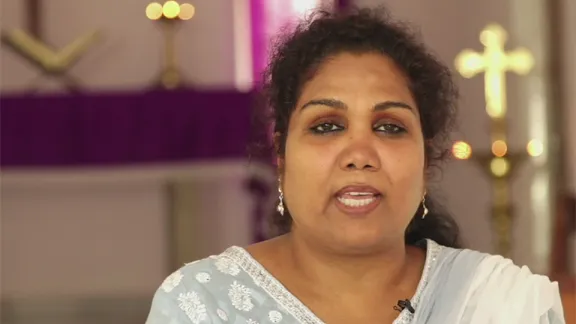
green&just Bible study speaker Rev. Dr Monica Jyotsna Melanchthon, India
Hundreds of Lutherans Across the Globe Gather Online for green&just
An initial poll of some of the 400 people who took part in The Lutheran World Federation (LWF) first virtual conference on the church’s role in environmental justice say the event prompted their greater involvement in ecological justice issues.
Most of the participants surveyed for the 12 May “green&just” virtual conference—who logged on from Africa, Asia and the Pacific, Europe, Latin America and North America—stayed online for more than three hours. In the preliminary survey of a smaller group, more than two-thirds of the respondents said they were likely or would definitely become actively engaged in issues on ecological justice.
The 17 presentations including speeches and web-based workshops (webinars) were met with high interest by participants, with lively online discussions after the speeches and during the workshops, said Rev. Roger Schmidt, LWF Youth secretary, organizer of “green&just.”
Speakers and participants at “green&just” called for marshalling of church and community resources to address the environmental, economic and development crises.
In a video address, LWF General Secretary Rev. Martin Junge pointed to a distorted view of freedom that has led to overconsumption in some parts of the world, which has meant that billions of people elsewhere, who rely on nature for their sustenance, starve.
“In the era of climate change, the old theological formula according to which sin is a person’s withdrawal into oneself, severing relationships, takes on a new dynamic. Our existence repeatedly threatens to withdraw into itself,” Junge said.
“Climate change and the catastrophic consequences thereof are a direct result of an extension of freedom accompanied by increased disregard for the relationships that are integral to humanity,” the general secretary said.
In his keynote address Kumi Naidoo, executive director of Greenpeace International, criticized the “business as usual approach” to getting the world aligned and moving toward a clean green energy direction. He described climate change as an urgent cross-cutting issue “that threatens the very fundamental existence of human life on this planet” and stressed the need to broaden the base of those engaged in order to move the issue forward.
Noting the specific role of religious leaders in major historic struggles across the world including the civil rights movement and apartheid, Naidoo praised the LWF “for taking the kind of leadership you are through this conference—taking environment and justice, development and climate change; and bringing them together—and asking what can we do as a faith community?”
Peruvian activist Esther Hinostroza spoke about the struggle of women in mining areas battling both environmental degradation and poverty. Lutheran theologians Rev. Dr Monica Jyotsna Melanchton of Gurukul Theological Seminary in Chennai, India, and Rev. Dr Barbara Rossing from the Lutheran School of Theology at Chicago, USA explored biblical texts and their challenges for ecological justice.
Participants of the virtual conference gave enthusiastic feed-back.
Rev. Dr Anja Stuckenberger of Reading, Pennsylvania, a pastor in the Evangelical Lutheran Church in America, who participated in some of the webinars, considered the conference an energizing space and praised the opportunity to listen to presentations from all over the world and converse with people from different perspectives.
Rev. Sonja Skupch, general secretary of the Evangelical Church of the River Plate, Argentina said: “It is encouraging to know that there are more people fighting for justice than those who benefit from excessive greed.”
Moti Daba Fufa, a youth leader in his congregation of the Ethiopian Evangelical Church Mekane Yesus, praised the use of social media in grappling with environmental justice. “We met each other from different countries and got to raise issues from our different angles.”
Eighty percent of the poll respondents came from Lutheran churches, including pastors, youth and women leaders. “The conference provided an important learning platform about the different ways in which we can encourage our church members at the grass roots to engage theologically on critical issues such as climate change and economic justice,” Schmidt added. (669 words)


